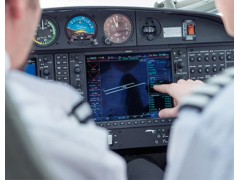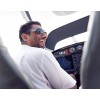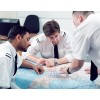As one of FTA’s most popular courses, the Integrated Flight Deck Programme takes students with little or no flying experience to a “Frozen ATPL” in approximately 16 months. This is the minimum qualification that an airline would require from a prospective First Officer.
once you gain 1,500 hours’ experience, your ATPL becomes ‘unfrozen’, meaning that your licence becomes a full ATPL; the licence required to be an airline Captain. This full-time, integrated course is the preferred training route for most airlines.
Click here for a detailed overview of our course fees.
Flight training & phases:
Our full-time, standard Integrated Flight Deck Programme typically takes approximately 16 months, and is broken down into several phases as outlined below. All phases are completed from our base at Brighton City Airport, West Sussex. Please note, the order in which phases are completed may vary, depending on the course start date.
BASIC THEORY
Duration: 3 weeks
Location: Brighton City Airport, UK
Skills acquired: The foundation knowledge required to start the first flight phase. Subjects include aircraft general knowledge, air law, mass and balance, navigation, performance and planning, and meteorology.
ATPL THEORY
Duration: 6 months (700 classroom hours)
Location: Brighton City Airport, UK
Skills acquired: The Airline Transport Pilot Licence (ATPL) teaches students the theory required to operate commercial aircraft safely and professionally. There are 3 sections – and students take the corresponding examination with the Civil Aviation Authority at Gatwick after each completed section.
SECTION 1 SUBJECTS
Meteorology
Aircraft General Knowledge
Air Law
IFR Communications
VFR Communications
SECTION 2 SUBJECTS
Principles of Flight
Instrumentation
Performance
Flight Planning
SECTION 3 SUBJECTS
Operational Procedures
General Navigation
Radio Navigation
Human Performance & Limitations
Mass & Balance
FLYING PHASES 1 & 2
Duration: 2 + 2 weeks
Location: Brighton City Airport, UK
Fleet: DA40 EFIS & Conventional (See our fleet.)
Flying time: 10 hours (Phase 1) + 20 hours (Phase 2)
Skills acquired: In Phase 1, you will learn the manoeuvres and airmanship required to operate an aircraft – including take off, general handling and landing. You will also start to operate the radio. By the end of Phase 1, you will be ready for your first solo flight.
In Phase 2, you will improve your aircraft handling skills, start your instrument and navigational flights, and also complete approximately 10 hours of solo flying time.
FLYING PHASE 3
Duration: approximately 2 months
Location: Brighton City Airport, UK
Fleet: DA40 EFIS & Conventional
Flying time: 55 hours
Skills acquired: Advanced manoeuvres, navigational and instrument techniques. By the end of Phase 3, you will be highly proficient in visual and instrument flight, and fully prepared to take the last flight stage.
FLYING PHASE 4 & MCC
Duration: 2-3 months (132 hours inc. MCC & tests)
Location: Brighton City Airport, UK
Fleet: DA40 EFIS & Conventional • DA42 EFIS & EFIS Simulator • Cessna Citation
Skills acquired: You are now able to commercially operate single and multi-engine aircraft, and can be tested for a ME CPL (Multi-Engine Commercial Pilot Licence).
Now you will learn how to fly the aircraft by sole reference to instruments under Instrument Flight Rules (IFR).
One of the most challenging parts of the course, this is wher students learn how to safely operate the aircraft in controlled airspace during normal and abnormal operations.
You will also learn how to operate and use complex systems like the FMS, FADEC, A/P, de-icing & anti-icing systems and air-data computer. This phase will equip you with all the knowledge required to complete crucial pre-flight, during flight and post-flight duties at a professional level that will exceed the industry standard. Your last flight will be your Multi Engine Instrument Rating Skill Test.
| SECTION 1 SUBJECTS | |
|
|
FOUNDATION DEGREE WITH BUCKS NEW UNIVERSITY (OPTIONAL)
Course Overview:
For cadets who wish to achieve a Frozen ATPL plus the added benefit of a degree, FTA offers the option of an Integrated Flight Deck Programme with FdSc Air Transport Management with Commercial Pilot Training, in partnership with Buckinghamshire New University (course number FR2FLY9). This will allow students to benefit from the additional advantage of holding a foundation degree in the aviation field. On completion of this course, students who have successfully completed the Foundation Degree can further upgrade to a BSc (Hons) Air Transport Management with Commercial Pilot Training. Please see the Bucks Degree tab below for further details.
*Enrolment for the degree option is subject to minimum student number requirements set by Bucks New University. For full details, please contact the university directly via their online enquiry form.
Course outline:
The Bucks degree enables students to gain their Frozen ATPL, plus the added benefit of a degree to enhance careers prospects.
Increasingly airlines are looking to their flight crew to offer more than ever and are calling for pilots to demonstrate commercial intelligence, in addition to the ability to pilot an aircraft. This course enables students to develop not only the pilot skills and knowledge required of a First Officer, but also an understanding of the commercial and operational challenges facing the dynamically changing and fast paced aviation industry. Students will develop an understanding and recognition of how pilots can directly affect profitability and contribute to the bottom line through a diverse range of skills from conserving fuel to displaying excellence in customer care.
The course is delivered continuously throughout the year in conjunction with Buckinghamshire New University, a leader in the field of aviation degrees with pilot training. The academic programme, which has a focus on fulfilling the needs of future employers, has been developed in collaboration with industry professionals.
The Flight Deck Programme with the FdSc Air Transport Management with Commercial Pilot Training is split into two parts. The first covers the flight training and academic theory for a foundation degree conducted from our base at Brighton City Airport.
The foundation degree runs concurrently with the Integrated Flight Deck Programme, which will typically take approximately 16 months to complete. Students who have successfully completed the Flight Deck Programme with FdSc Air Transport Management with Commercial Pilot Training may upgrade, if they wish, to the one year BSc (Hons) Air Transport with Commercial Pilot Training (FDL Top Up) degree offered via distance learning (please click here for more information)
For more information regarding the FdSc, click here for the Department of Travel and Aviation at Buckinghamshire New University.
Academic Theory:
The programme, which covers important areas of the aviation industry, seeking to develop a student’s wider understand of the industry in which they wish to be employed. Academic modules include:
Structure and development of the air transport industry
Provides students with understanding of both the historical and current structure and development of the air transport industry, the nature and purpose of the air transport operators and current sustainability challenges facing the industry.
Air transport – security and safety
Provides students with an understanding of safety and security issues within the air transport industry, the challenges of worldwide operations and the procedures implemented globally for the safe carriage of air passengers and cargo.
Airport operations
Service concepts, operational procedures, regulatory requirements and customer service expectations are discussed in the context that airport and airline operators are dependent upon each other to deliver the total passenger experience.
Introduction to finance and economics
This module enables students to understand and interpret fundamental financial and economic concepts generally and specifically to aviation. It provides a theoretical underpinning of key subjects, such as financial statements, ratio analysis, demand, supply, costs, production, market structures and elasticities and provides an overview of airline financial performance and airline metrics.
Airline management
The airline industry, characterised by historically high revenues and low profitability, is one of the key drivers of global economic growth. Knowledge in a wide range of airline management areas such as planning, commercial operations and revenue/ancillary revenue management is imperative since airlines cannot function effectively without each manager havin an understanding of the entire airline business due to the interdependence of the various functional areas.
Management, leadership and change
Provides students with an opportunity to acquire, develop and enhance awareness, knowledge and understanding of essential theories and concepts relating to the principles of management and leadership and to determine how these are fundamental to the success of industry operators in today’s highly competitive and challenging business environment.
Why airlines fail
Airlines play a fundamental role in tourism, mobility, economic development and regional growth. Passenger numbers double approximately every 15 years. Despite this, as a result of capital outlay required, business risks and susceptibility to external events beyond their control, airlines are the worst performing element, in financial terms, of the air transport value chain. This module enables students to analyse and assess reasons for this phenomenon, in particular those applicable to network airlines in short-haul markets.
Student Loans:
One of the major benefits of completing the Flight Deck Programme with a degree is that it could, subject to eligibility, provide you with access to funding in the form of a student loan which enables students to access both tuition fee and maintenance loans. More information on finance available can be found by following the link: https://www.gov.uk/student-finance
For more information on the BSc Honours upgrade please click here.
COURSE START DATES
Start Dates
2016:
24th October
12th December
2017:
20th February
24th April
19th June
21st August
23rd October
11th December














